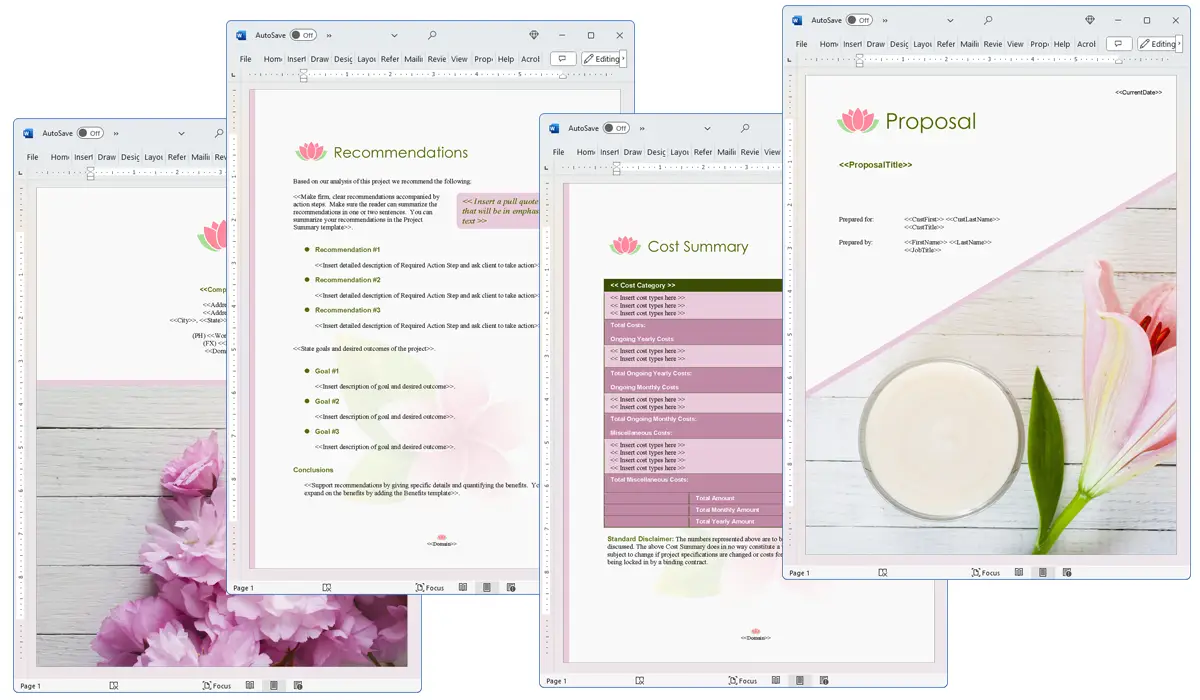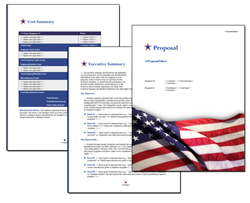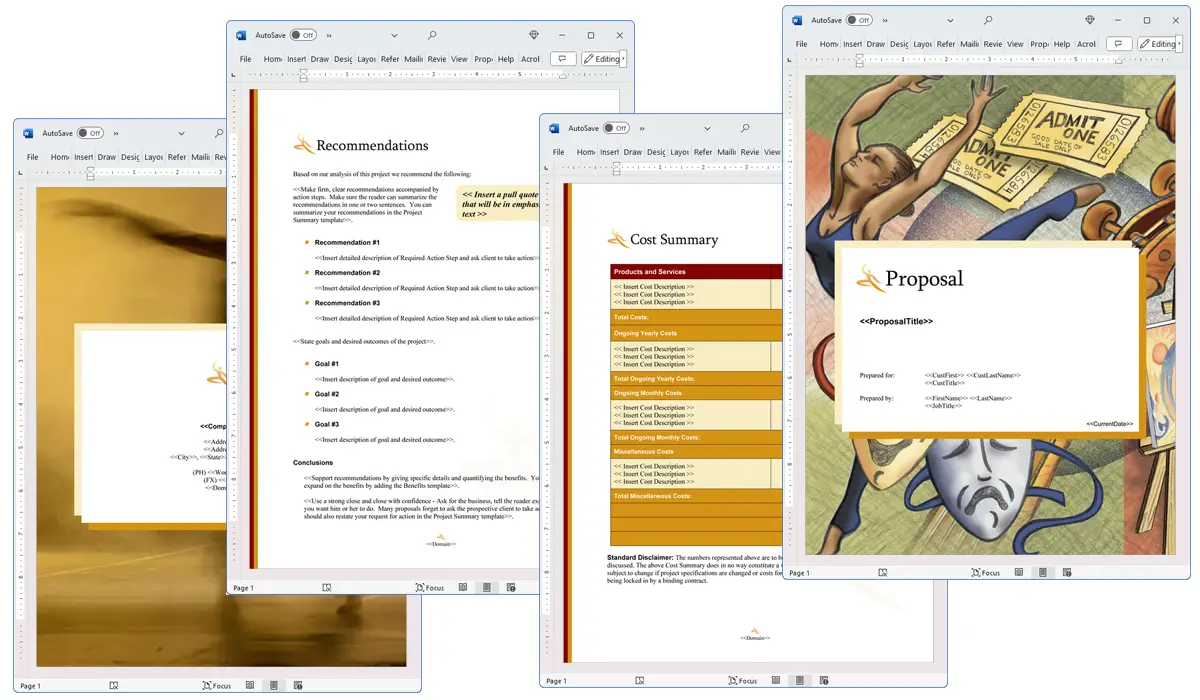What is the Communications chapter used for?
Proposal Kit Professional Bundle adds more design themes, all six Contract Packs,
a project management library, and Expert Edition software.

Illustration of Proposal Pack Hospitality #2
We include this Communications chapter template in every Proposal Pack, along with thousands more. You assemble this chapter with others in various combinations to create custom-tailored business proposals, plans, reports, and other documents. Proposal Packs apply custom visual designs to the templates, giving the final documents a consistent professional finish.
 DOWNLOADABLE, ONE-TIME COST, NO SUBSCRIPTION FEES
DOWNLOADABLE, ONE-TIME COST, NO SUBSCRIPTION FEES
Overview of the Communications Chapter
In the field of business proposals, the Communications chapter serves as an important component for outlining the methods and expectations around communication for the duration of a project or business relationship. This chapter is particularly useful for setting clear guidelines on how parties will interact, which can include frequency of updates, preferred channels of communication, and any specific communication practices to be either followed or avoided. Properly defining these elements can prevent misunderstandings and ensure a smooth flow of information between all involved parties.
How is the Communications Chapter Used?
The Communications chapter is primarily used in business proposals to articulate the planned or existing communication strategies related to a project or ongoing service. It helps in documenting what types of communications are encouraged or required, such as regular email updates, weekly printed reports, or monthly meetings. Additionally, it can specify communications that are not allowed, such as the use of social media for sharing confidential project details. This chapter is important in establishing the groundwork for professional and effective communication throughout the duration of a business engagement.
What is Included in the Communications Chapter?
Typically, the Communications chapter will include:
- A description of the communication methods to be used during the project.
- The frequency and format of regular updates and reports.
- A list of recommended or mandatory communication tools (e.g., specific email platforms, project management software).
- Guidelines on prohibited forms of communication to safeguard company policies and project integrity.
- Any other relevant details that tailor the communication needs to the specific context of the proposal.
Use Case Examples for the Communications Chapter
- Employment Proposals: To define the onboarding communication strategy, including orientation schedules and initial training processes.
- Human Resources: For documenting internal communication policies that apply to employees, such as restrictions on the use of social media during work hours.
- Service Sales: To outline customer service communication protocols, including how and when clients will receive updates about the services they have purchased.
Key Takeaways
- Establishes Clear Communication Guidelines: Ensures all parties are on the same page regarding how and when communication will occur.
- Prevents Misunderstandings: By clearly defining allowed and prohibited communication methods, it reduces the potential for confusion.
- Enhances Efficiency: Regularly scheduled updates and predefined communication methods can streamline project management and response times.
- Supports Policy Enforcement: Helps reinforce company policies on communication, maintaining professional standards and data security.
- Flexible to Needs: Can be tailored to suit the unique requirements of different types of business proposals, from HR to service sales.
Overall, the Communications chapter is a foundational element in many business proposals, ensuring that all participants have a clear, shared understanding of how to communicate throughout their engagement.

Illustration of Proposal Pack Flag #6
 What Our Clients Say
What Our Clients SayThis is a great product specially for grant writer. I have been using it since 2014."
 4.7 stars, based on 849 reviews
4.7 stars, based on 849 reviewsRelated Chapters
- Client Expectations
- Marketing Plan
- Communications Plan
- Management
- Lead Generation
- Advertising
- Teamwork
- Command and Control
- Broadcasting
- Transmission
- Discussions
- Editing
- Interactivity
- Response Time
- Lag Time
- Latency
- Wireless
- Reporting
- Webinars
- Media
- Outages
- Telecommunications
- Copywriting
- Advertisers
- Ambassadors
- Team Members
- Transparency
- Sign Language
- Rapid Response
- Hub
Samples Using the Communications Chapter
Document Layouts Using the Communications Chapter
- Software Licensing Sales Proposal
- Marketing Communications Proposal Template
- International Research and Development Project Proposal
- Outsourcing Customer Support Proposal
- Company Operations Manual
- Employee Handbook
- Elderly Care Services Proposal
- Outsourcing Telemarketing Proposal
- Security System and Communication Proposal
- Disaster Preparation and Training Proposal
- Telecommuting Support Proposal

The Communications chapter and other chapters are integrated into a Word document as illustrated here in the Proposal Pack Entertainment #9 design theme. There are hundreds of design themes available, and every design theme includes the Communications chapter template.
A proper business proposal will include multiple chapters. This chapter is just one of many you can build into your proposal. We include the complete fill-in-the-blank template in our Proposal Pack template collections. We also include a library of sample proposals illustrating how companies in different industries, both large and small, have written proposals using our Proposal Packs. This template will show you how to write the Communications.
We include a chapter library for you to build from based on your needs. All proposals are different and have different needs and goals. Pick the chapters from our collection and organize them as needed for your proposal.
Using the Proposal Pack template library, you can create any business proposal, report, study, plan, or document.
The Wizard software includes an AI Writer, which will write the content of this and any other chapter of your document. Use the AI Writer to do the heavy lifting, writing the first draft of your proposal or business document in minutes.
 Ian Lauder has been helping businesses write their proposals and contracts for two decades. Ian is the owner and founder of Proposal Kit, one of the original sources of business proposal and contract software products started in 1997.
Ian Lauder has been helping businesses write their proposals and contracts for two decades. Ian is the owner and founder of Proposal Kit, one of the original sources of business proposal and contract software products started in 1997.By Ian Lauder
 Published by Proposal Kit, Inc.
Published by Proposal Kit, Inc.


 Cart
Cart
 Facebook
Facebook YouTube
YouTube Bluesky
Bluesky Search Site
Search Site